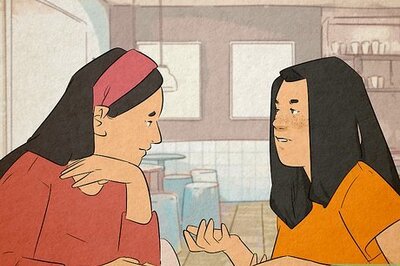
views
Fifteen minutes into Shoojit Sircar's October, the 21-year-old Shiuli (Banita Sandhu) slips into a coma after surviving a 30 feet fall. We barely know anything about Shiuli except that she is a diligent hotel management trainee, who smiles at customers pleasantly, likes hanging out with her friends and is a colleague of the surly protagonist, Dan (Varun Dhawan). We, as an audience, haven't known her long enough to truly care what happens to her at this point. But, as the film proceeds, it becomes clear that Sircar has made it his film's mission to engage the audience's interest in her life (and death).
After the fall, Shiuli lies comatose in the hospital for months. We never hear her speak again in the film, neither do we see her do anything else. However, through Dan and a motley of talented supporting cast, Sircar skilfully and slowly introduces her to us.
We learn that she played the piano and loved jasmine, and that she chose to study hotel management instead of engineering. We also come to know that she was the oldest of the two siblings and her mother's precious daughter. But it is through Dan and his dogged devotion to Shiuli's well-being that Sircar anchors our attention and affection strongly into her.
So, when the question of whether to wait for her recovery or pull the plug arises, we, as an audience, have already made up our mind. We, like Dan, do not want Shiuli to die. Neither does her mother (played brilliantly by Gitanjali Rao) nor her siblings. Sircar's mastery lies in the sensitivity he has shown in dealing with this subject.
Passive euthanasia is not only a controversial topic but also a sentimental one, especially for the family members of the patient whose euthanasia is being considered (in this case, Shiuli's family). However, as Shiuli's uncle drones on about mounting hospital bills and the uncertainty of her recovery and cites them as reasons for pulling the plug, we see no melodrama or outrage from her family or Dan (a remarkable feat for a Bollywood film). At one point, Dan calmly tells Shiuli's uncle that the decision of keeping her alive isn't theirs, and they cannot make that choice for her. Moreover, he adds, that Shiuli is just 21-year-old, she must want to live.
The film doesn't dwell on this discussion further and neither does it specify if Shiuli ever had a 'living will', without which her relatives would not be able to take her off life support even if they wanted to. Instead, Sircar brings us to the central arguments that are often cited in discussions surrounding passive euthanasia -- can another person decide if someone's life is worth living? Is the plug being pulled because medical care is expensive and, if so, is that a valid reason? Is passive euthanasia in Shiuli's best interest?
October proceeds without ever attempting to answer the questions it poses, because Sircar's film isn't about death. October is Sircar's ode to hope, love and the ever-changing nature of the world. As Shiuli lies unconscious in her hospital bed, seasons change, babies are born, people get married, her best friend starts dating and everything and everyone moves on, except Dan.
For Dan life becomes an endless wait for Shiuli's recovery. With a rare nuanced approach, the film encompasses the monotonous dreadfulness of the lives of a terminally ill patient's family, and loved one (Dan), who keep waiting for normalcy to return, knowing very well that things can never go back to the way they were.
Hardly anything ‘happens’ throughout the duration of October. To some, the film may even appear slow. But, in its languid pace, October very much mirrors reality. Many life-altering things happen to us over the course of time, and yet if we examine our day-to-day life, it feels the same; likewise, Dan changes drastically from the beginning of the film to the end, and yet, as the film progresses, we barely notice the metamorphosis, because our attention is focused on Shiuli's recovery.
Many a sappy romances have been made, where one of the protagonists is either about to die in a fatal accident or is terminally ill. Nicholas Sparks has made a career out of these tear-jerkers. However, none of these hold a candle to Juhi Chaturvedi's wonderfully written film, which encapsulates the fragile emotions of love and hope beautifully.
October, at its heart, is the love story that Bollywood needed for but could never make. Whether Shiuli ever loved Dan isn't clear and Dan's interest in Shiuli is also open to interpretation. But these facts are inconsequential. Day after day, as we see Dan turn up at the hospital caring for Shiuli and waiting for her recovery, we see a love that's greater than your average filmy romance. We see a love without conditions, a love that is kind, a love that is patient. A love that waits.




















Comments
0 comment